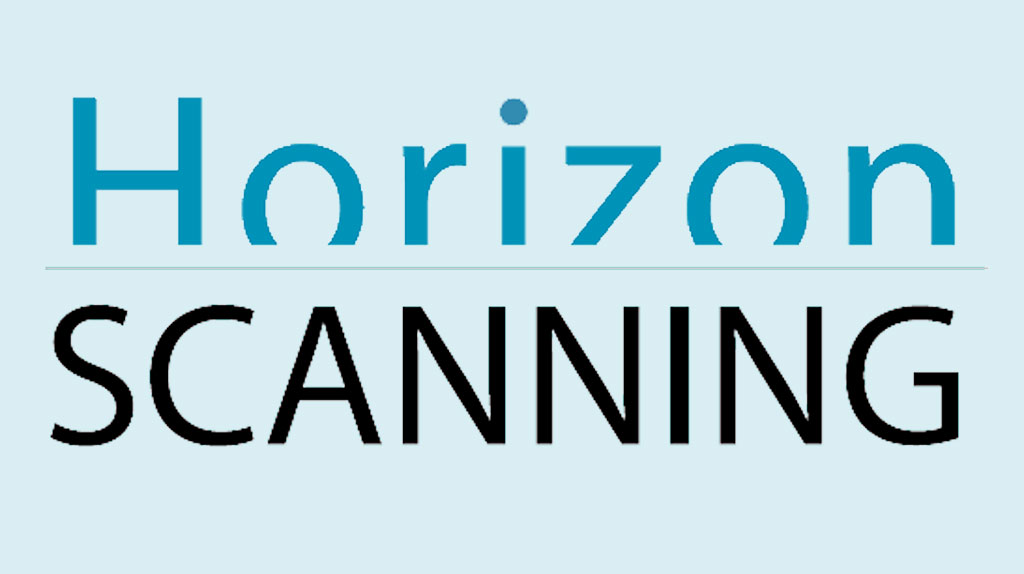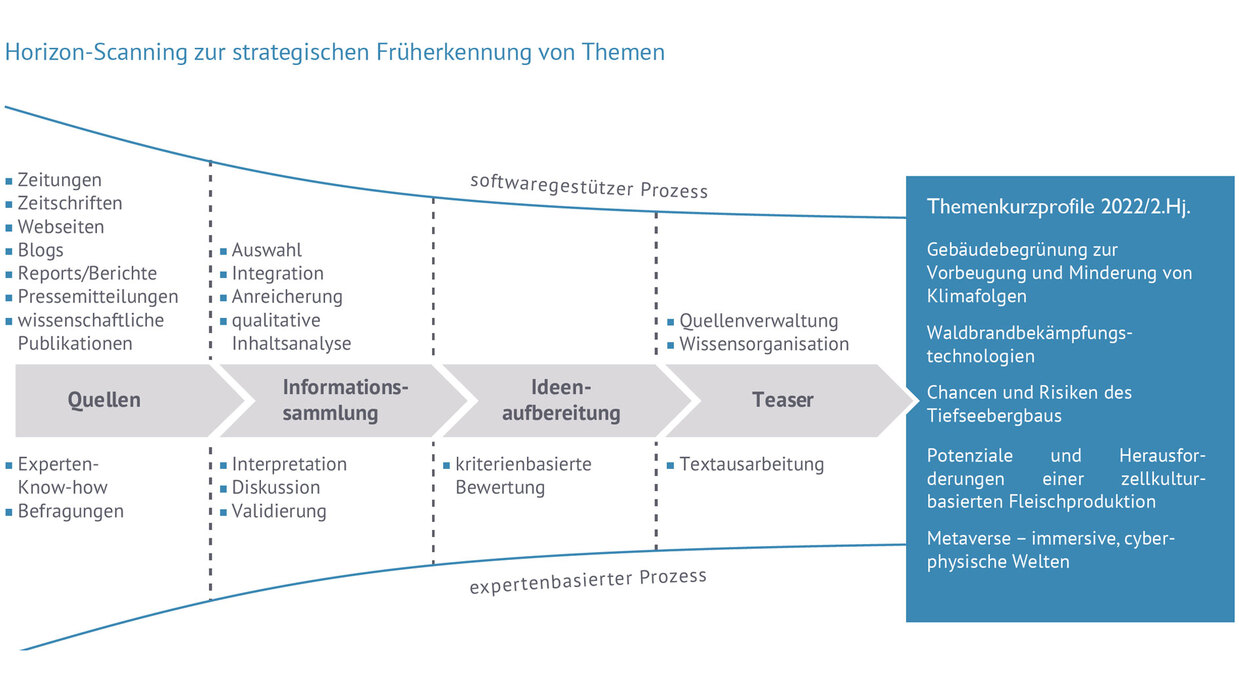
Horizon scanning
- Project team:
Tobias Hungerland (Project Management), Christoph Bogenstahl, Marc Bovenschulte, Marlène de Saussure, Simone Ehrenberg-Silies, Sonja Kind, Robert Peters, Stephan Richter
- Thematic area:
- Topic initiative:
Committee on Education, Research and Technology Assessment
- Startdate:
2014
- Enddate:
2028
sprungmarken_marker_2196
Background and objectives
Horizon scanning is part of the methodological spectrum of technology assessment at TAB and has been carried out regularly since 2014 by the Institute for Innovation and Technology (iit) of the cooperation partner VDI/VDE Innovation + Technik GmbH.
Horizon scanning is used to monitor new technological developments and systematically assess their opportunities and risks. In this way, the potential for technological, economic, ecological, social and political change is identified and described as early as possible. The aim of horizon scanning is to contribute to the orientation of research and innovation policy and to the opinion formation of the Committee for Education, Research and Technology Assessment.
Approach and results
In practice, horizon scanning is carried out as a combination of software-based search and analysis steps and an expert-based validation and evaluation process.
The software-based process primarily analyses qualitative data and information to identify potential issues. The process starts with the selection of sources to be considered: These include internet magazines, blogs and the main leading print media, popular science sources, but also scientific foresight reports and reviews.
At the same time, an expert-based process is carried out to validate and evaluate the prepared information, which is based on the expertise of the participating experts both in the VDI/VDE-IT team and in the entire TAB. The following criteria are used for the selection of the proposed topics
Public discourse: The topic is covered in the media, controversies/conflicts arise, social actors take a stand.
Topic characteristics: The topic represents a technological development/innovation and touches on social, economic, environmental, ethical or geopolitical issues.
Time horizon: The topic is expected to remain in the political and social debate for the next 5 to 10 years and to gain in importance.
Relevance: There is an increased need for information on the part of policy makers; the legal framework may need to be adapted; one or more policy areas will be addressed.
The (interim) result is a collection of information on current scientific and technological trends in the form of annotated topic headings (teasers), which are then discussed with all TAB participants with regard to their relevance and suitability for further analysis. The result of this discussion is a final list of topics for which short profiles are produced and submitted to the TA Rapporteur Group prior to publication. All topic profiles (publication series, only German) ("publication series") provide a compact overview of the state of scientific, technological and socio-economic developments in a topic and their relevance for policy and society. They also include a detailed bibliography and a description of possible further work on the topic.
Publications (only in German)
Bogenstahl, C.
2025. Büro für Technikfolgen-Abschätzung beim Deutschen Bundestag (TAB). doi:10.5445/IR/1000183041
Saussure, M. de
2025. Büro für Technikfolgen-Abschätzung beim Deutschen Bundestag (TAB). doi:10.5445/IR/1000183040
Kind, S.
2025. Büro für Technikfolgen-Abschätzung beim Deutschen Bundestag (TAB). doi:10.5445/IR/1000183039
Hille, M.
2025. Büro für Technikfolgen-Abschätzung beim Deutschen Bundestag (TAB). doi:10.5445/IR/1000183038
Bovenschulte, M.; Bernhold, S.
2025. Büro für Technikfolgen-Abschätzung beim Deutschen Bundestag (TAB). doi:10.5445/IR/1000183037
Hille, M.
2025. Büro für Technikfolgen-Abschätzung beim Deutschen Bundestag (TAB). doi:10.5445/IR/1000179508
Richter, S.
2025. Büro für Technikfolgen-Abschätzung beim Deutschen Bundestag (TAB). doi:10.5445/IR/1000179509
Bogenstahl, C.
2024. Büro für Technikfolgen-Abschätzung beim Deutschen Bundestag (TAB). doi:10.5445/IR/1000179504
Hungerland, T.
2024. Büro für Technikfolgen-Abschätzung beim Deutschen Bundestag (TAB). doi:10.5445/IR/1000179500
Bovenschulte, M.; Hungerland, T.
2024. Büro für Technikfolgen-Abschätzung beim Deutschen Bundestag (TAB). doi:10.5445/IR/1000179498
Kind, S.; Hille, M.
2024. Büro für Technikfolgen-Abschätzung beim Deutschen Bundestag (TAB). doi:10.5445/IR/1000172202
Bovenschulte, M.
2024. Büro für Technikfolgen-Abschätzung beim Deutschen Bundestag (TAB). doi:10.5445/IR/1000172201
Hungerland, T.; Saussure, M. de
2024. Büro für Technikfolgen-Abschätzung beim Deutschen Bundestag (TAB). doi:10.5445/IR/1000172199
Ehrenberg-Silies, S.
2024. Büro für Technikfolgen-Abschätzung beim Deutschen Bundestag (TAB). doi:10.5445/IR/1000171628
Meißner, L.; Czerniak-Wilmes, J.; Kind, S.
2024. Büro für Technikfolgen-Abschätzung beim Deutschen Bundestag (TAB). doi:10.5445/IR/1000169054/v2
Saussure, M. de; Grünwald, R.
2023. Büro für Technikfolgen-Abschätzung beim Deutschen Bundestag (TAB). doi:10.5445/IR/1000161890
Bogenstahl, C.; Richter, S.
2023. Büro für Technikfolgen-Abschätzung beim Deutschen Bundestag (TAB). doi:10.5445/IR/1000161889
Hungerland, T.
2023. Büro für Technikfolgen-Abschätzung beim Deutschen Bundestag (TAB). doi:10.5445/IR/1000161888
Kind, S.
2023. Büro für Technikfolgen-Abschätzung beim Deutschen Bundestag (TAB). doi:10.5445/IR/1000161886
Peters, R.; Krieger, B.
2023. Büro für Technikfolgen-Abschätzung beim Deutschen Bundestag (TAB). doi:10.5445/IR/1000161885
Peters, R.
2023. Büro für Technikfolgen-Abschätzung beim Deutschen Bundestag (TAB). doi:10.5445/IR/1000156306
Jetzke, T.; Dassel, K.
2023. Büro für Technikfolgen-Abschätzung beim Deutschen Bundestag (TAB). doi:10.5445/IR/1000156303
Bogenstahl, C.
2023. Büro für Technikfolgen-Abschätzung beim Deutschen Bundestag (TAB). doi:10.5445/IR/1000156300
Czerniak-Wilmes, J.; Jetzke, T.
2023. Büro für Technikfolgen-Abschätzung beim Deutschen Bundestag (TAB). doi:10.5445/IR/1000156299
Kind, S.; Jetzke, T.
2023. Büro für Technikfolgen-Abschätzung beim Deutschen Bundestag (TAB). doi:10.5445/IR/1000156298
Kind, S.; Meißner, L.
2022. Büro für Technikfolgen-Abschätzung beim Deutschen Bundestag (TAB). doi:10.5445/IR/1000150235
Peters, R.; Krieger, B.
2022. Büro für Technikfolgen-Abschätzung beim Deutschen Bundestag (TAB). doi:10.5445/IR/1000150233
Jetzke, T.
2022. Büro für Technikfolgen-Abschätzung beim Deutschen Bundestag (TAB). doi:10.5445/IR/1000150232
Kind, S.
2022. Büro für Technikfolgen-Abschätzung beim Deutschen Bundestag (TAB). doi:10.5445/IR/1000150231
Kind, S.
2022. Büro für Technikfolgen-Abschätzung beim Deutschen Bundestag (TAB). doi:10.5445/IR/1000143464
Abel, S.
2022. Büro für Technikfolgen-Abschätzung beim Deutschen Bundestag (TAB). doi:10.5445/IR/1000143463
Peters, R.
2022. Büro für Technikfolgen-Abschätzung beim Deutschen Bundestag (TAB). doi:10.5445/IR/1000143462
Richter, S.
2022. Büro für Technikfolgen-Abschätzung beim Deutschen Bundestag (TAB). doi:10.5445/IR/1000143461
Kind, S.
2022. Büro für Technikfolgen-Abschätzung beim Deutschen Bundestag (TAB). doi:10.5445/IR/1000143460
Enzweiler, K.
2021. Büro für Technikfolgen-Abschätzung beim Deutschen Bundestag (TAB). doi:10.5445/IR/1000134318
Peters, R.
2021. Büro für Technikfolgen-Abschätzung beim Deutschen Bundestag (TAB). doi:10.5445/IR/1000134317
Bogenstahl, C.; Richter, S.
2021. Büro für Technikfolgen-Abschätzung beim Deutschen Bundestag (TAB). doi:10.5445/IR/1000134314
Kind, S.
2021. Büro für Technikfolgen-Abschätzung beim Deutschen Bundestag (TAB). doi:10.5445/IR/1000134312
Ehrenberg-Silies, S.
2021. Büro für Technikfolgen-Abschätzung beim Deutschen Bundestag (TAB). doi:10.5445/IR/1000134310
Bogenstahl, C.; Peters, R.
2021. Büro für Technikfolgen-Abschätzung beim Deutschen Bundestag (TAB). doi:10.5445/IR/1000131774
Peters, R.; Bovenschulte, M.
2021. Büro für Technikfolgen-Abschätzung beim Deutschen Bundestag (TAB). doi:10.5445/IR/1000131769
Ehrenberg-Silies, S.; Richter, S.
2021. Büro für Technikfolgen-Abschätzung beim Deutschen Bundestag (TAB). doi:10.5445/IR/1000131768
Kind, S.; Jetzke, T.
2021. Büro für Technikfolgen-Abschätzung beim Deutschen Bundestag (TAB). doi:10.5445/IR/1000131766
Kind, S.
2020. Büro für Technikfolgen-Abschätzung beim Deutschen Bundestag (TAB). doi:10.5445/IR/1000133950
Bovenschulte, M.
2020. Büro für Technikfolgen-Abschätzung beim Deutschen Bundestag (TAB). doi:10.5445/IR/1000133949
Bogenstahl, C.; Richter, S.
2020. Büro für Technikfolgen-Abschätzung beim Deutschen Bundestag (TAB). doi:10.5445/IR/1000133946
Ehrenberg-Silies, S.
2020. Büro für Technikfolgen-Abschätzung beim Deutschen Bundestag (TAB). doi:10.5445/IR/1000133944
Jetzke, T.; Richter, S.
2020. Büro für Technikfolgen-Abschätzung beim Deutschen Bundestag (TAB). doi:10.5445/IR/1000133939
Peters, R.
2020. Büro für Technikfolgen-Abschätzung beim Deutschen Bundestag (TAB). doi:10.5445/IR/1000131777
Ehrenberg-Silies, S.
2019. Büro für Technikfolgen-Abschätzung beim Deutschen Bundestag (TAB). doi:10.5445/IR/1000133938
Jetzke, T.; Peters, R.
2019. Büro für Technikfolgen-Abschätzung beim Deutschen Bundestag (TAB). doi:10.5445/IR/1000133936
Richter, S.
2019. Büro für Technikfolgen-Abschätzung beim Deutschen Bundestag (TAB). doi:10.5445/IR/1000133935
Bovenschulte, M.
2019. Büro für Technikfolgen-Abschätzung beim Deutschen Bundestag (TAB). doi:10.5445/IR/1000133933
Bogenstahl, C.
2019. Büro für Technikfolgen-Abschätzung beim Deutschen Bundestag (TAB). doi:10.5445/IR/1000133932
Richter, S.; Jetzke, T.
2019. Büro für Technikfolgen-Abschätzung beim Deutschen Bundestag (TAB). doi:10.5445/IR/1000133927
Jetzke, T.; Bogenstahl, C.
2019. Büro für Technikfolgen-Abschätzung beim Deutschen Bundestag (TAB). doi:10.5445/IR/1000133917
Kind, S.
2019. Büro für Technikfolgen-Abschätzung beim Deutschen Bundestag (TAB). doi:10.5445/IR/1000133912
Kind, S.; Bovenschulte, M.
2019. Büro für Technikfolgen-Abschätzung beim Deutschen Bundestag (TAB). doi:10.5445/IR/1000133911
Bovenschulte, M.
2019. Büro für Technikfolgen-Abschätzung beim Deutschen Bundestag (TAB). doi:10.5445/IR/1000133910
Kind, S.
2018. Büro für Technikfolgen-Abschätzung beim Deutschen Bundestag (TAB). doi:10.5445/IR/1000133909
Enzweiler, K.; Goluchowicz, K.; Jetzke, T.; Kind, S.; Bovenschulte, M.
2018. Büro für Technikfolgen-Abschätzung beim Deutschen Bundestag (TAB). doi:10.5445/IR/1000133908
Ferdinand, J.-P.; Jetzke, T.
2018. Büro für Technikfolgen-Abschätzung beim Deutschen Bundestag (TAB). doi:10.5445/IR/1000133906
Jetzke, T.
2018. Büro für Technikfolgen-Abschätzung beim Deutschen Bundestag (TAB). doi:10.5445/IR/1000133905
Ferdinand, J.-P.; Kind, S.
2018. Büro für Technikfolgen-Abschätzung beim Deutschen Bundestag (TAB). doi:10.5445/IR/1000133904
Enzweiler, K.; Kind, S.; Jetzke, T.
2018. Büro für Technikfolgen-Abschätzung beim Deutschen Bundestag (TAB). doi:10.5445/IR/1000133903
Kind, S.; Weide, S.
2017. Büro für Technikfolgen-Abschätzung beim Deutschen Bundestag (TAB). doi:10.5445/IR/1000133902
Kind, S.; Richter, S.
2017. Büro für Technikfolgen-Abschätzung beim Deutschen Bundestag (TAB). doi:10.5445/IR/1000133901
Jetzke, T.; Richter, S.
2017. Büro für Technikfolgen-Abschätzung beim Deutschen Bundestag (TAB). doi:10.5445/IR/1000133900
Ferdinand, J.-P.; Jetzke, T.
2017. Büro für Technikfolgen-Abschätzung beim Deutschen Bundestag (TAB). doi:10.5445/IR/1000133629
Kind, S.; Bogenstahl, C.
2017. Büro für Technikfolgen-Abschätzung beim Deutschen Bundestag (TAB). doi:10.5445/IR/1000133628
Jetzke, T.; Weide, S.
2017. Büro für Technikfolgen-Abschätzung beim Deutschen Bundestag (TAB). doi:10.5445/IR/1000133627
Bogenstahl, C.; Ferdinand, J.-P.
2017. Büro für Technikfolgen-Abschätzung beim Deutschen Bundestag (TAB). doi:10.5445/IR/1000133626
Bogenstahl, C.; Ferdinand, J.-P.; Weide, S.
2017. Büro für Technikfolgen-Abschätzung beim Deutschen Bundestag (TAB). doi:10.5445/IR/1000133625
Ehrenberg-Silies, S.; Kind, S.; Apt, W.; Bovenschulte, M.
2017. Büro für Technikfolgen-Abschätzung beim Deutschen Bundestag (TAB). doi:10.5445/IR/1000133494
Kind, S.; Jetzke, T.; Weide, S.; Ehrenberg-Silies, S.; Bovenschulte, M.
2017. Büro für Technikfolgen-Abschätzung beim Deutschen Bundestag (TAB). doi:10.5445/IR/1000133492
Ehrenberg-Silies, S.; Kind, S.
2016. Büro für Technikfolgen-Abschätzung beim Deutschen Bundestag (TAB). doi:10.5445/IR/1000127190
Richter, S.; Kind, S.
2016. Büro für Technikfolgen-Abschätzung beim Deutschen Bundestag (TAB). doi:10.5445/IR/1000127188
Richter, S.; Jetzke, T.
2016. Büro für Technikfolgen-Abschätzung beim Deutschen Bundestag (TAB). doi:10.5445/IR/1000127187
Kind, S.; Thiele, D.
2016. Büro für Technikfolgen-Abschätzung beim Deutschen Bundestag (TAB). doi:10.5445/IR/1000127186
Jetzke, T.; Richter, S.
2016. Büro für Technikfolgen-Abschätzung beim Deutschen Bundestag (TAB). doi:10.5445/IR/1000127185
Jetzke, T.; Bovenschulte, M.; Ehrenberg-Silies, S.
2016. Büro für Technikfolgen-Abschätzung beim Deutschen Bundestag (TAB). doi:10.5445/IR/1000127184
Kind, S.; Ehrenberg-Silies, S.
2016. Büro für Technikfolgen-Abschätzung beim Deutschen Bundestag (TAB). doi:10.5445/IR/1000127183
Thiele, D.; Ehrenberg-Silies, S.
2016. Büro für Technikfolgen-Abschätzung beim Deutschen Bundestag (TAB). doi:10.5445/IR/1000127182
Kind, S.; Ehrenberg-Silies, S.
2016. Büro für Technikfolgen-Abschätzung beim Deutschen Bundestag (TAB). doi:10.5445/IR/1000127180
Thile, D.; Ehrenberg-Silies, S.
2016. Büro für Technikfolgen-Abschätzung beim Deutschen Bundestag (TAB). doi:10.5445/IR/1000127175
Bovenschulte, M.; Ehrenberg-Silies, S.; Jetzke, T.; Kind, S.; Richter, S.
2015. Büro für Technikfolgen-Abschätzung beim Deutschen Bundestag (TAB). doi:10.5445/IR/1000127174
Ehrenberg-Silies, S.; Compagna, D.; Schwetje, O.; Bovenschulte, M.
2014. Büro für Technikfolgen-Abschätzung beim Deutschen Bundestag (TAB). doi:10.5445/IR/1000133535

